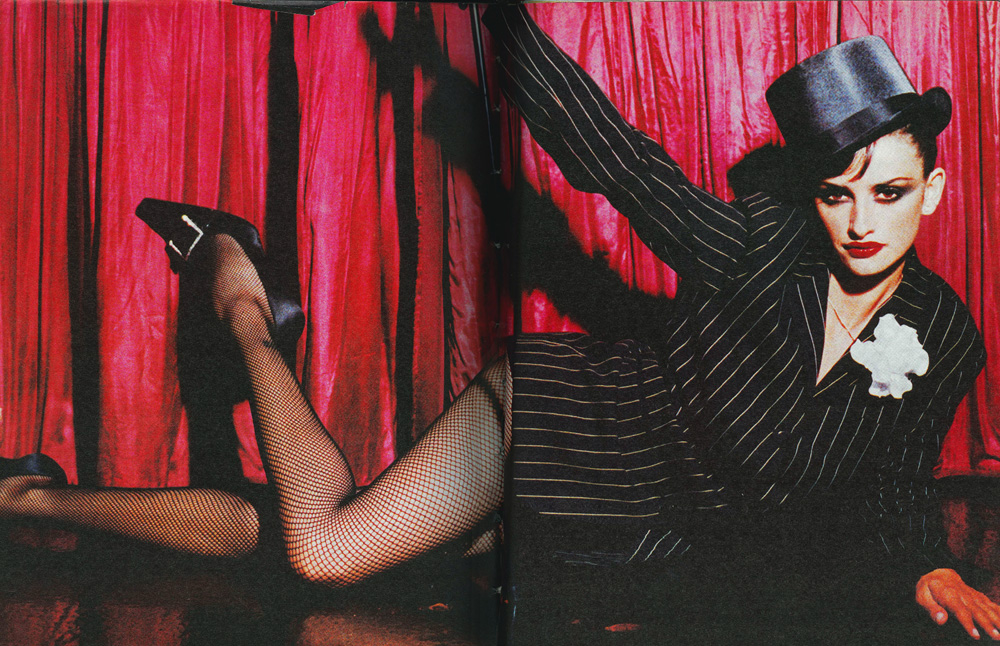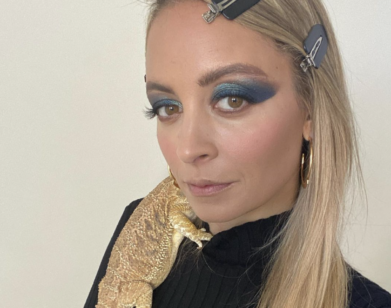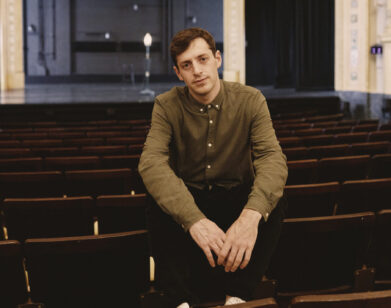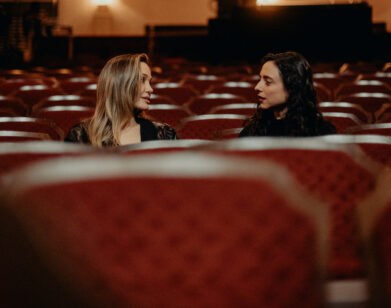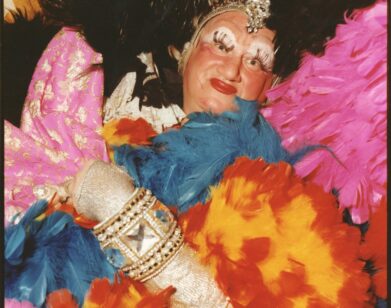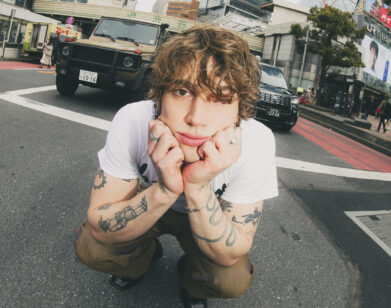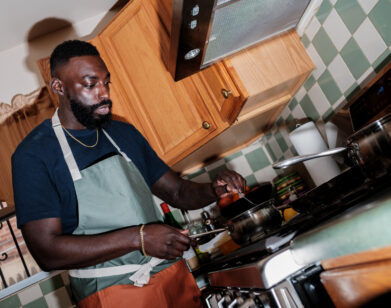New Again: Penélope Cruz
After an award-winning first season focusing on O.J. Simpson‘s infamous 1995 trial, two more installments of anthology series American Crime Story are in the works for 2018. While the second season will be set in the aftermath of Hurricane Katrina, the third season, titled Versace, will explore the murder of fashion designer Gianni Versace.
A few days ago, The Hollywood Reporter revealed that Oscar-winning actress Penélope Cruz has been cast in the emotionally charged role of Gianni Versace’s sister, the platinum-haired Donatella Versace, who took over the fashion house after his death. In anticipation of Cruz’s television debut, we’re reprinting her Interview cover feature from December of 2000, when her American film career had only just begun. At the time, she had just starred in All the Pretty Horses, one of her first lead English-speaking roles, alongside Matt Damon. In the interview, Cruz is remarkably down to earth, conveying a sense of poise beyond her years, as she discusses her upcoming movies, views on religion, and her own mental health.—Tahnsarah Peters
A Dazzler from the Old World Lights up the New
By Stephen Galloway
Penélope Cruz’s face and manner are ravishing and hypnotic, in the best Hollywood siren fashion—but in the past, that wouldn’t have gotten her very far in this country. Her unashamed, highly charged, European sophistication and eroticism would have once been a hard fit on our movie screens (even the glorious Sophia Loren couldn’t build the American career she desired a generation ago). Latin actors (like most “minorities”) succeeded in America—if at all—by Anglicizing as much of themselves as they could (like Rita Hayworth), or else watched as their careers sidetracked into supporting roles (like Rita Moreno’s) or stereotypical vehicles (Antonio Banderas’). But thankfully, it now looks like that’s starting to change—many keeping a close eye on the movies agree that the nascent American career of Spain’s Penélope Cruz is inciting an excitement that could make her the most explosive actress to hit our screens in years. And they further agree that Hollywood’s silent protocols finally seem to be opening up.
This must have been one of Ralph Lauren’s thoughts when he chose Penélope Cruz to star in this year’s new Ralph Lauren ad campaign. Lauren’s decision was more than an actress’ lucky career break: this designer creates not only apparel, furnishings, and fragrances, but iconography—an American iconography rooted in collective memories and desires. So when Lauren selects Penélope Cruz rather than a more conventional Hollywood figure to wear his clothes and appear in his images, it’s a signal that something exciting is finally happening to how this country views itself, that we’re expanding our notion of what movie stars are, and can be.
We’re ending the first year of a new century in which balance of power will have to be shared by growing numbers of people of color, in which “American” will mean many ways of being and appearing. Cruz, a big, ambitious, exciting talent, is touching down in Hollywood at just this very historic moment. (This month, she opens at the central but elusive figure that motivates much of the action in Billy Bob Thornton’s film All the Pretty Horses, playing a bewitching Mexican woman you’d gladly join the movie’s young heroes in following to the ends of the earth. With a career in Spanish films already smoking (and one she certainly seems to have no intention of walking away from) Cruz could become a truly global movie star, watched by the entire world. —Patrick Giles
STEPHEN GALLOWAY: You’ve been in nearly thirty movies, dating back to 1992, when you filmed two Spanish films, Belle Époque, which won an Oscar for Best Foreign Film, and Jámon Jámon. They pretty much launched you as a star in Spain and in Europe, but not as much here. In fact, it’s only been in the last couple of years that you have been really breaking into American movies, beginning with The Hi-Lo Country in 1998. Now, you’re about to be seen in you biggest American film yet, All the Pretty Horses, with Matt Damon. But apparently though the studio needed convincing before signing you?
PENÉLOPE CRUZ: I met [director] Billy Bob Thornton in L.A.; I loved his film Sling Blade [1996] and I think we connected very well. Then he saw some of the movies I did. He told me that he thought I was right for the part. So we did a test in New York and a test in Rome, with Matt [Damon]. Anthony Minghella directed the test. Billy told me, “I think this will happen and I think you are right for it.” After many tests, they said yes.
GALLOWAY: What is the movie about?
CRUZ: It is an impossible love story. To me, it’s not a movie, it’s a life experience that I went thorough and is there forever. Everybody involved agrees something very special was going on. Billy put all his heart in it and all his honesty. He has a way to describe what the movie is about that I think is beautiful: “Whoever in the world has any pain or regret, it is OK to live with it, but not to live in it.”
GALLOWAY: What was working with Matt Damon like?
CRUZ: This part was one of the first things I did in English, and Matt helped me a lot. His acting in it is the best thing he has ever done—such a pure, perfect, round work, full of soul and full of truth. He’s amazing.
GALLOWAY: The tabloids were full of talk that the two of you were dating.
CRUZ: [shakes her head] We are very good friends. We get asked that almost everyday.
GALLOWAY: You’ve just done two big films due out next year, Captain Corelli’s Mandolin with Nicolas Cage and Christian Bale, and the Johnny Depp picture, Blow.
CRUZ: I play a small part in Blow. This is a story about Johnny’s character, George Jung. I play his wife, and she is a cocaine addict.
GALLOWAY: That doesn’t sound like you!
CRUZ: [laughs] I am very sensitive to everything. I cannot even drink coffee! In the film, we had to do all these lines of lactose. But I think that is the shoot where I laughed the most, because Johnny is one of the funniest people in the world.
GALLOWAY: Captain Corelli’s Mandolin was a much bigger project. That’s the first really big-budget American film where you have a leading role.
CRUZ: It was every day, every hour, and it’s a very intense exercise for acting. Something comes from that exhaustion when you are working. But we all had dinner in the same restaurant in Greece almost every single night of the summer—the whole crew—and it was beautiful. I felt like one of the characters in Hunter S. Thompson’s books, where they all go to the same bar every day.
GALLOWAY: And then [director] Cameron Crowe flew out and offered you the lead opposite Tom Cruise in Vanilla Sky, which you will be filming shortly. Had you ever met Cruise before?
CRUZ: No. But I have now, now that we are rehearsing. I don’t know how he can have all that energy. He is into every detail of the film. I understand why he is working so hard. He seems happy.
GALLOWAY: What kind of character will you play?
CRUZL We cannot talk about it yet. I can tell you it is a love story set in New York, a contemporary love story. I play a Spanish woman from Madrid. From my city!
GALLOWAY: I heard that in most of Europe, they don’t even notice you when you’re out—but in Madrid, there are a bunch of vans with TV cameras following you around. Is that true?
CRUZ: Well, in Madrid I have been working for many years. I cannot complain about the way the press treats me there, because they treat me in a nice way. I think it would be stupid to be complaining.
GALLOWAY: Is it very different working in Spain than in America?
CRUZ: No, I think the pressure for the actor is the same. You have the same way to prepare and then you are on the set, and they call you and you wait a lot. Maybe here you wait more because there are longer shoots in general. Except for [director] Pedro Almodavar’s films [which have bigger budgets than most Spanish film and, therefore, longer shooting schedules].
GALLOWAY: Almodovar seems almost your opposite—completely out there and extravagant and wild.
CRUZ: Ah, but he knows I have that part in me. Pedro knows me as if he was my second mother! He can see everything in me—it is very scary, sometimes. But we are friends, so he doesn’t hurt me. He doesn’t talk a lot to me about that part of myself. I know I have it—and he knows it, too.
GALLOWAY: You have worked with Almodovar on two films, Live Flesh [1997], and All About My Mother, which is probably your most famous film. How did these movies come about?
CRUZ: I was always obsessed with Pedro. I always wanted to work with him. He is someone I have a very special relation with—like we know other from before.
GALLOWAY: When did you first meet him?
CRUZ: In a casting at his house for Kika [1993]. I remember I was very nervous that day. I think about him and see him places.
GALLOWAY: So when you first met him what did you talk about? Was it just the two of you together in his house?
CRUZ: Yes, in his house. We did some rehearsals and he told me I was too young for that and that he was going to call me again, He did and he called me for Live Flesh. Then he called me when he was writing All About My Mother, and he said, “I am thinking about you for this.”
GALLOWAY: I love that film.
CRUZ: Me, too.
GALLOWAY: You grew up in Spain?
CRUZ: I was born in Madrid in 1974. My mother was working as a hairdresser for many years and my father was working with his brother in a chain of stores.
GALLOWAY: What made you want to act?
CRUZ: I think I always wanted to do it. And I was dancing ballet for so many years, since I was four. It was like a desire or necessity to communicate feelings and emotions. Sometimes I feel we express more with dancing or acting or painting than with words. My parents took me to dance lessons because I had so much energy. I was a very intense child.
GALLOWAY: Are you close to your family?
CRUZ: Very close. I miss them a lot, especially these days. They gave me the freedom and the space to do what I wanted. At the same time, they were worried about my health. I had a very big crisis when I was sixteen because I was over exhausted. I thought I could do everything, but it was all too much for my body and my mind.
GALLOWAY: What do you mean by a crisis?
CRUZ: I was stressed and made a sickness out of it. I had a horrible, horrible breakdown. It was jus huge, like the worst period of my life, and it lasted for a couple of months. I had only had two crises like that—when something inside stings, like you are eliminating something. Both times it was because I was over-stressed.
GALLOWAY: When was the other one?
CRUZ: Last week.
GALLOWAY: Last week?!
CRUZ: I was shooting the whole summer—and every day, because I was in every scene of Corelli. I had a beautiful time, but I didn’t rest when I finished—only for ten days in Mexico with my family. Then immediately after that, I went to Madrid for four days. I worked the four days and then I came to L.A. to do publicity for Woman on Top. Then I went to Calcutta.
GALLOWAY: What were you doing in Calcutta?
CRUZ: A documentary for a Spanish foundation to raise money for kids. We can raise a lot of money for these girls that were living in the street and are now in a house studying. So I couldn’t delay it. But when I came back here, I broke down—and also because of everything I saw in India. There is more pain there than you can imagine. I couldn’t even cry from what I was seeing because I had to work. So you become like stone. And then once I left, everything came out.
GALLOWAY: And how did that affect you?
CRUZ: I decided I had two choices: I could go down, or up. So I quit smoking and started a much healthier diet, and started meditating again.
GALLOWAY: Are you religious?
CRUZ: No, I do not call myself anything. I was raised as a Catholic, but I believe in God in my own way and I pray in my own way and I respect all kinds of philosophies. The one philosophy or religion I find I am most close to is the Buddhist one. I think it is the one that respects others and the one that doesn’t say that this is the only way. I think happiness is the moment when—if you’ve forgotten those little things—they suddenly come back into focus for you.
GALLOWAY: It’s very easy to forget them, especially when you’re a movie star.
CRUZ: I haven’t forgotten them. But I saw myself in huge danger of forgetting them because of the huge amount of stress that I had. I said, No, I don’t want to live like that. I have to value every single thing. I have food every day on the table, I have a family, friends, health—all the things without which it wouldn’t matter how many roles I get to play.
GALLOWAY: You’ve done an awful lot of other things, too. I know you once spent time with the late Mother Teresa, interviewing her for a Spanish newspaper.
CRUZ: Yes. They called me to go and spend eight days working in the different houses that she had in Calcutta and interview her. We saw her every day. She was already very old and she was working and doing everything with her hands. She didn’t stop. Her energy was amazing. When you see the streets of Calcutta and then see what this woman did—she saved so many people’s lives.
GALLOWAY: And didn’t you interview the Dalai Lama for a newspaper? How did that come about?
CRUZ: The Tibetan house of Spain called me to do pictures in Nepal about Tibetan children and their exile. So I went and spent eight days in Kathmandu. I took pictures of the children who had escaped from Tibet and were living there. They had frozen fingers from walking days and months in the snow. Some were shot with bullets. The Dalai Lama came when the photos were exhibited, and when he entered the room, I thought I couldn’t speak. I just wanted to go out and start crying to relieve that strong energy.
GALLOWAY: It must be quite a culture shock to go from that to where you are now—not just a star in the movies but also a very visible presence in the current Ralph Lauren campaign.
CRUZ: I think Ralph saw some of my movies and then called asking to have a meeting. They offered me the campaign, and I was very happy because I love fashion and fashion photography. I have followed Ralph Lauren’s work since I was very little. I love his taste and he is sexy and classy at the same time. And I am also getting to work with photographers like Bruce Weber, who can teach me a lot of things. I want to be a photographer some day and combine it with my work.
GALLOWAY: Lauren has said you remind him of Audrey Hepburn. Do you see the resemblance?
CRUZ: I love her. But when I hear that, I feel it is too big if a compliment because I think she was amazing. She is one of my favorite actors.
GALLOWAY: She also made a life for herself outside the movies. How do you imagine your own life in ten years?
CRUZ: In ten years? I would like to have, probably, one or two kids, but I cannot plan this. I have to find the person to do it with. I think I’d like to live in two places. Maybe Madrid and New York, or Madrid and L.A. I am going to get an apartment in New York in the summer.
GALLOWAY: I have been meaning to ask you this since we began: What is that necklace around your neck? Are those letters on it? Do they say anything?
CRUZ: It says in French: “Beauty, virtue, and glory, I found those things in her.”
GALLOWAY: That’s lovely. Speaking of personal attributes—to someone who doesn’t know you, what would be the biggest surprise for him or her to learn about you?
CRUZ: When I really lose my temper, I repeat everything eighty times—again and again and again and again. Like I am talking to myself. But that takes a lot of energy away.
GALLOWAY: So you have a hot temper?
CRUZ: Oh, yes. I am a Taurus, after all!
THIS ARTICLE ORIGINALLY APPEARED IN THE DECEMBER 2000 ISSUE OF INTERVIEW.
For more from our archives, click here.

